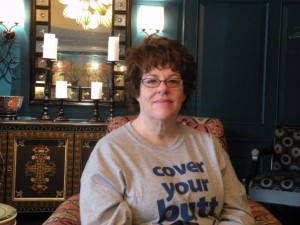“My Voice” by Deborah Kanter

Deborah Kanter - 'Survivor'
Remember the song with the line, “I am a warrior”? I am. Yes, I am a cancer survivor but just being a survivor is not enough. Since that day in April 1999 when what I had long suspected—cancer- was uttered by a gastroenterologist, I became Deborah-Survivor-Warrior. And basically, despite my holistic nature and fondness for meditation and Qi Gong to replenish and relax—I am a warrior for life without cancer.
Cancer is a teacher; cancer is still a peripheral companion although I remain cancer free for ten years. Cancer never leaves entirely; the imprint lingers, side effects of treatment remain, the integrative wellness plan takes work, vitamins, herbs, food choices and more. Blood tests, checkups, frequent colonoscopies are part of my life ever since the utterance of the words-“rectal tumor.” Long before the words were uttered the pain, bleeding, weight loss, and grayish pallor pantomimed the words. After they were said aloud, the survivor- warrior, rather dormant since hippie protest days, reemerged.
I was and still am not completely comfortable with the word ‘survivor’; I thought Holocaust and that stands alone. Yes, cancer is a form of holocaust; a destruction of good cells, a change in appetite, appearance, energy level and drive. Cancer can kill with a wicked, impersonal, uncaring ferocity. If I am to be called a ‘survivor,’ then, I must look at the fight of those who were trapped, incarcerated, killed in the Holocaust. I had to become active and really be worthy of the word. And I became one for people with cancer, focusing on colorectal cancer.
I wondered exactly what this Stage III rectal cancer warrior-survivor should do to maintain personal wellness, help others fight the big fight which often focuses on the pharmaceutical/medical industry, insurance limitations, less than fully effective cancer legislative policies and the general learned fear-based thought process of the person with cancer as a victim or walking dead.
So, in the years immediately following the diagnosis and treatment I did what I knew how to do—I spoke at local conferences, wellness gatherings, wherever I could and wrote in local and national publications about the cancer, that I was not my tumor, that I was not sick (continual diarrhea as a result of chemotherapy, burning, bloodied ulcerative proctitis from radiation’s burn, completely changed response to eating, and perpetual energy from too many steroids that accompanied chemo and radiation treatment). I was completely healthy experiencing the symptoms of cancer. And I continued writing, speaking, and eventually enrolling full time in a graduate program in holistic health.
Warriors attract warriors and during graduate study in holistic health at Georgian Court University I met Sister-warriors in the truest sense. Women, many older and members of the clergy, fought hard for human justice. They traveled to South America, met with Sandinistas, helped build houses in villages and cared for their community at the University and beyond. I studied with teachers who were forerunners in the holistic wellness movement and who urged me to tell my story even more. I spoke to undergraduate and graduate classes about cancer, in my own way, removing, even for only a little while, perhaps, the still palpable fear of cancer, stigma of the world colorectal, particularly the rectal syllables of the word, demonstrating that humor, life, and achievement can prevail, even in the most tenuous times—I felt like a warrior; I accepted the word survivor. Study with Michael Lerner, author of one of the books that became a daily cancer reading, Choices in Healing, taught me that healing was possible no matter the physical condition. I was determined to take that message wherever I could and after my master’s degree was completed, I began. I still travel that path.
I wanted to do more. I started by becoming an active participant on the Association of Online Resources (ACOR) colorectal cancer listserv. That message board was a perpetual 700-member plus hug for me during my active treatment and post treatment days that followed. I wrote frequently, citing experience, information, and support and I still remain active and appreciative. I attended Colon Cancer Alliance conferences to learn, meet with others and extend support. During one of the conferences I learned that One Voice Against Cancer (OVAC) was going to advocate in Washington, DC—talk with senators and congressmen about the need for reform in legislation, prevention, education. I later learned that a new organization –Colorectal Cancer Coalition (C3 Coalition) – was going to concentrate on advocacy efforts for colorectal cancer, termed by many “a forgotten cancer.” No more!
Beginning in 2007, I participated in local and national advocacy work, including the Colorectal Cancer Coalition’s annual March Call on Congress in Washington, DC. The opportunity to take my story, knowledge, and passion to State and Federal leaders was empowering, and significant, personally and for the bigger cause—the continual effort to eliminate cancer—to find the cure, to fund the cure, and to provide funds, facilities, people to establish Federal colorectal cancer screening centers, to educate, inform, and to support. I am looking forward to this year’s Call on Congress and the chance to reunite with other impassioned advocates and friends.
As a cancer survivor- warrior, I feel it is a significant part of my life-path to keep telling the story, teaching others that healing is possible and that life can be remarkably fine after cancer, and to advocate for those with colorectal cancer and for all of us—cancer survivors.
I believe that anyone who has experienced cancer can be termed a survivor. Each person will find a way to define the word and choose to act upon it, or not. It is a life choice.


